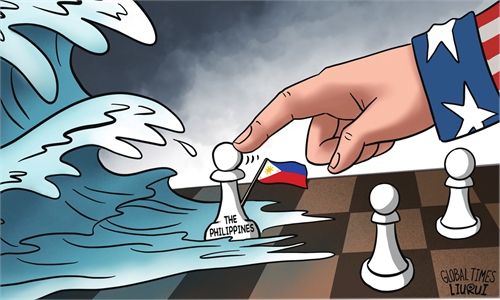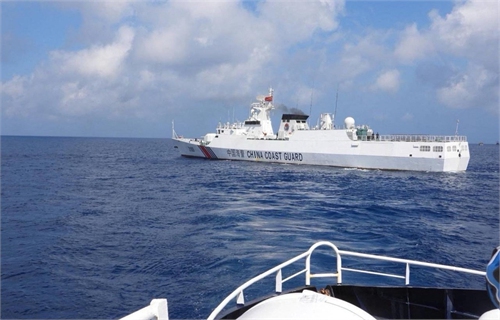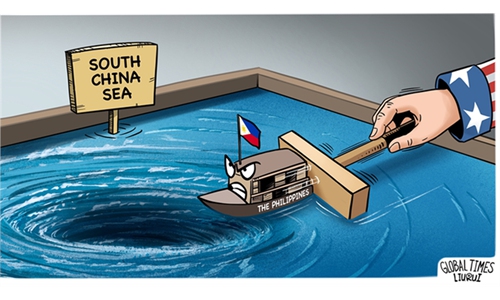'Philippines should commit as much as possible to being consistent on neutrality'

The JS Akebono, HMAS Warramunga and BRP Antonio Luna sail in formation during a multilateral maritime military exercise between Australia, the US, Japan and the Philippines in the South China Sea on April 7, 2024. Photo: VCG
Editor's Note:
The escalation of recent tensions between China and the Philippines raises concerns among neighboring countries in the South China Sea. How will the Philippines' provocations, instigated and supported by the US, affect the situation in the South China Sea in the rest of 2024? Why does ASEAN hope that the situation will be contained?
In the "ASEAN Perspective on the South China Sea" series, we collect wisdom and insights from former diplomats and scholars from ASEAN member countries. In an interview with Global Times (GT) reporter Wang Wenwen, Benedict Weerasena (Weerasena), research director of Malaysia-based Bait Al Amanaha, an independent research institute, said that the key to managing the situation in the South China Sea is peaceful dialogue.
Engaging as much as possible in diplomacy is essential, and all parties should exercise restraint, despite the threat of tensions escalating, he noted.
GT: Since last year, tensions in the South China Sea have been escalating. In a recent move, the Philippines made provocations at Xianbin Jiao in the South China Sea, with its ship continuously and dangerously approaching China Coast Guard ships that were conducting normal navigation. What do you think of the Philippines taking these provocative actions?
Weerasena: I believe that it's a reassertion on the Philippines' hedging strategy. The competitive game between China and the US has contributed to the Philippines' hedging strategy against China while ensuring that its ties with the US remain positive.
If we look at the past two decades, we can see that there have been three key phases of the Philippines's hedging pattern against China.
The first phase, from about 2001 to 2010, can be characterized by cooperative behavior over confrontational behavior with China. The next phase, from 2010 to 2016, saw a shift toward confrontational behavior over cooperative behavior. Finally, in the third key phase, from 2016 to 2022, a moderation of oppositional behavior can be seen.
Looking at these phases, it is clear that the Philippines in the past two decades has definitely been influenced by domestic changes in governance as well as external factors with regards to how it has addressed the issue in the South China Sea.
The Philippines has repeatedly made public statements confirming that it is pursuing diplomacy over military action in response to rising maritime tensions. This is the position that most Southeast Asian countries take. I hope that the Philippines is sincere and this commitment is backed up with action.
GT: To what extent will the Philippines' actions regarding the South China Sea disputes and its leaning toward the US affect ASEAN as a whole?
Weerasena: I think the foundational point to remember is that all ASEAN members exercise their own foreign policies. Because of this, it is hard to dictate what each member state should or should not do.
That being said, the Philippines' actions regarding the South China Sea have definitely somewhat impacted ASEAN unity and centrality. This has led to potential fragmentations.
For example, we can see slight fragmentation between Singapore and the Philippines. In other words, ASEAN unity, or the way ASEAN sees foreign policy, has been somewhat impacted by the developments in the South China Sea.
I also believe that this will influence how ASEAN, as a whole, navigates its relationships with external powers, both in the short term and the long term, particularly in terms of how ASEAN responds to both China and the US.
Furthermore, it has definitely impacted ASEAN's position and influence as a negotiator in global forums and as a regional convener, as different member states have adopted different foreign policies for their own national interest.
However, I don't think ASEAN's influence and impact are in danger of being completely undermined. Definitely, fragmentation is what's happening now, and I think that this fragmentation will continue in the near future. Nevertheless, I do not believe this fragmentation will lead to a complete breakdown of the role of ASEAN.
GT: What is the key to managing the situation in the South China Sea?
Weerasena: For me, above all, it's peaceful dialogue. Engaging as much as possible in diplomacy is essential, and all parties should exercise restraint, despite the threat of tensions escalating.
Of course, I understand that this is much easier said than done. That's why the second thing we need to manage is the code of conduct. ASEAN really needs to speed up the negotiations with China regarding the code of conduct to mitigate the risk of conflicts in this highly contested South China Sea.
There have been challenges in finalizing the code of conduct, which policymakers say will be completed by 2026. I think to facilitate this process, two things need to happen. First, greater trust needs to be built between the nations, especially among ASEAN member states and China. Second, the participants need to be willing to sign a legally binding agreement. I think this will definitely be a make-or-break situation for the effectiveness of the code of conduct.
GT: China and Malaysia have maintained friendly relations despite the South China Sea issue. What can the Philippines learn from this?
Weerasena: I think Malaysia has always positioned itself as equidistant between the US and China. It's maintaining a neutral position on a macro level while seeking inclusive but selective multi-layered partnerships with competing powers across micro-level domains.
I think that Philippines should commit as much as possible to being consistent on neutrality. Of course, as a third party and analyst, I can't dictate how the Philippines should decide on its foreign policy. However, I think it's very important for every ASEAN member state to continue pursuing a neutral equidistance stance between the major powers in the region.
Of course, we will still be committed to protecting our sovereignty, sovereign rights and interest in the maritime areas, in the South China Sea. But we must always remember that any issues, any matters and any conflicts must be resolved peacefully and constructively. And this is in accordance with the universally recognized principles of the international law, including in 1982 UNCLOS.
I think it's very important that we uphold this "rules-based order" that we have in the South China Sea, to resolve disputes through peaceful means via existing platforms and diplomatic channels, without compromising our principled positions.



